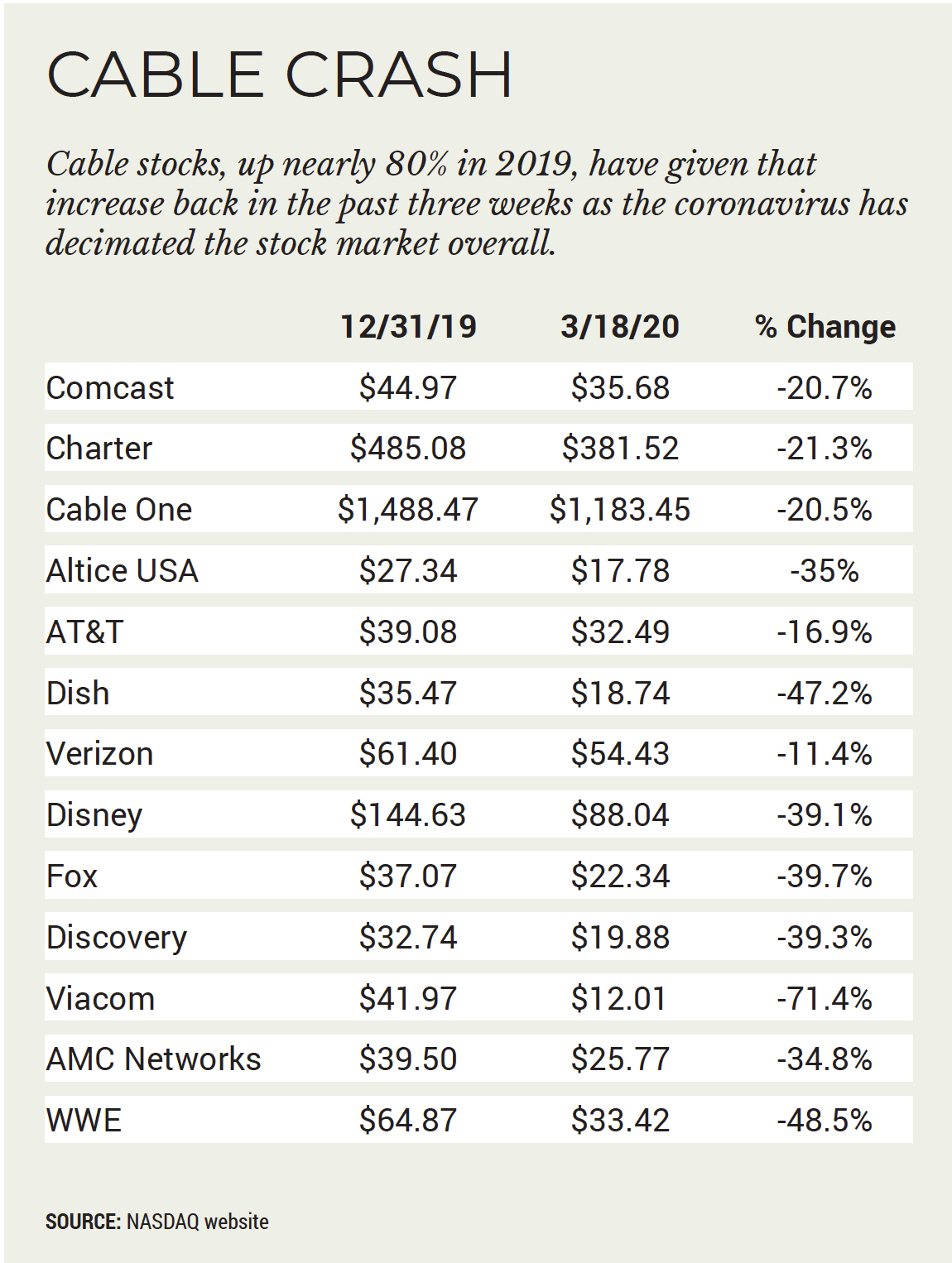Corona Crash Sends Stocks Into Tailspin
The smarter way to stay on top of the multichannel video marketplace. Sign up below.
You are now subscribed
Your newsletter sign-up was successful
As the coronavirus continued to obliterate the economy, cable stocks, less than three months after enjoying their best year in more than two decades, have given back all of those gains, with some stocks falling to their lowest points in years.
The Dow Jones Industrial Average has been on a seesaw since Feb. 20, with the markets losing and gaining thousands of points as sentiment shifted along with proposals for bailouts to counter the economic downturn accelerated by the COVID-19 outbreak. On March 18, the Dow fell 1,300 points (a three-year low), a day after a gain of more than 1,000 points and two trading days after the index saw its single largest point drop ever (2,997 points) on March 16. Since Feb. 20 the Dow has shed nearly 10,000 points — dropping from 29,220 to 19,893 on March 18.

Cable distribution stocks, which enjoyed a 78% gain in 2019 (their biggest increase since 1998), are now down a collective 21%. What’s most concerning is that the bulk of that decline has occurred in a little more than a month. Cable distribution stocks were on a pace toward a 16.5% gain until Feb. 20. Between Feb. 20 and March 18, the sector fell 32%.
Telco and satellite stocks are in almost the same boat. Between Dec. 31, 2019, and Feb. 20, the sector was up a modest 1.3%, fueled mostly by a 13% gain in Dish shares. But in the past five weeks, as Dish has fallen 54%, the sector lost 23% of its value.
The Dish decline, according to Moffett-Nathanson principal and senior analyst Craig Moffett, is tied to the satellite giant’s need to build out a nationwide wireless network. Dish agreed to purchase T-Mobile-Sprint’s prepaid wireless business as well as a swath of spectrum to build out a competing wireless service. Dish has said it will spend about $10 billion on that buildout, but many analysts believe that figure is low.
No Appetite for Big Plans
“The market’s appetite for big, expensive, and speculative projects has dried up,” Moffett wrote in a blog post.
The smarter way to stay on top of the multichannel video marketplace. Sign up below.
The cable distribution sector was supposed to be the one to ride out the coronavirus scare the best. With millions of people confined to their homes for work, play and school, cable subscriptions were expected to be more critical than ever. And not just for broadband access for work and school. With restaurants, bars, movie theaters and anywhere else where more than 10 people can gather within a six-foot radius of each other pretty much off limits, a pay TV connection is for some their sole source of entertainment.
The downturn has puzzled many.
Moffett noted that cable stocks losing all of their 2019 gains “makes no sense.”
“There is simply no plausible argument that a cable operator’s business will be anywhere near as cyclically exposed as the broader economy,” Moffett continued.
And investors shouldn’t bank on all cable stocks being unaffected, he added. He pointed to Comcast: Although cable distribution makes up more than 50% of its business, the company has theme-park and movie-studio operations that are affected by the outbreak. And he sees four segments of the overall industry that will likely be hardest hit by the coronavirus — business services, local advertising, housing formation and broadband share gains.
“But none of these factors are close to alarming, and, again, none come anywhere close to the level of exposure of the average business to a deep recession,” Moffett wrote. “In short, the cable stocks, to us, look badly oversold.”
Shaky Ground Under Programmers
Programmers were on shaky ground to begin with — shares in the sector were down 11% between Dec. 31 and Feb. 20 — but went into a near freefall in the past four weeks, shedding 37% since Feb. 20. In 2020, the stocks are down a disappointing 44%.
Among the top decliners was The Walt Disney Co., which hit its lowest point in six years on March 18 ($79.07 per share) before rallying to finish the day at $88.04 per share, its lowest close in two years. Disney stock is down 39% since the beginning of the year.
Disney is facing a triple whammy from COVID-19. Besides having to shut down its theme parks and delay theatrical releases from its movie studios in response to the coronavirus, ESPN is without live games because of the league suspensions (see Programming, page 8).
MoffettNathanson media analyst Michael Nathanson estimated that Disney’s Media Networks division, which includes ESPN and its ABC broadcast network, could see a $250 million decline in cash flow for fiscal 2020 due to the league shutdowns. And that includes a $150 million gain from not having to pay for sports rights.
“However, this could prove to be much worse on the cash flow line if ESPN is forced to pay for sports rights in the short term in exchange for longer term solutions,” Nathanson wrote.
Those declines are nothing compared to the cratering of ViacomCBS shares, only four months removed from the merger that was supposed to right the floundering programmer. ViacomCBS shares are down 71% since the beginning of the year, as the programmer was hit hard by the loss of the NCAA men’s basketball tournament. Adding pressure on the shares is the possibility that its largest shareholder — Shari Redstone’s National Amusements Inc. — may have to sell shares to satisfy debt covenants for the parent company. NAI has said it does not believe it will have to sell ViacomCBS stock.
